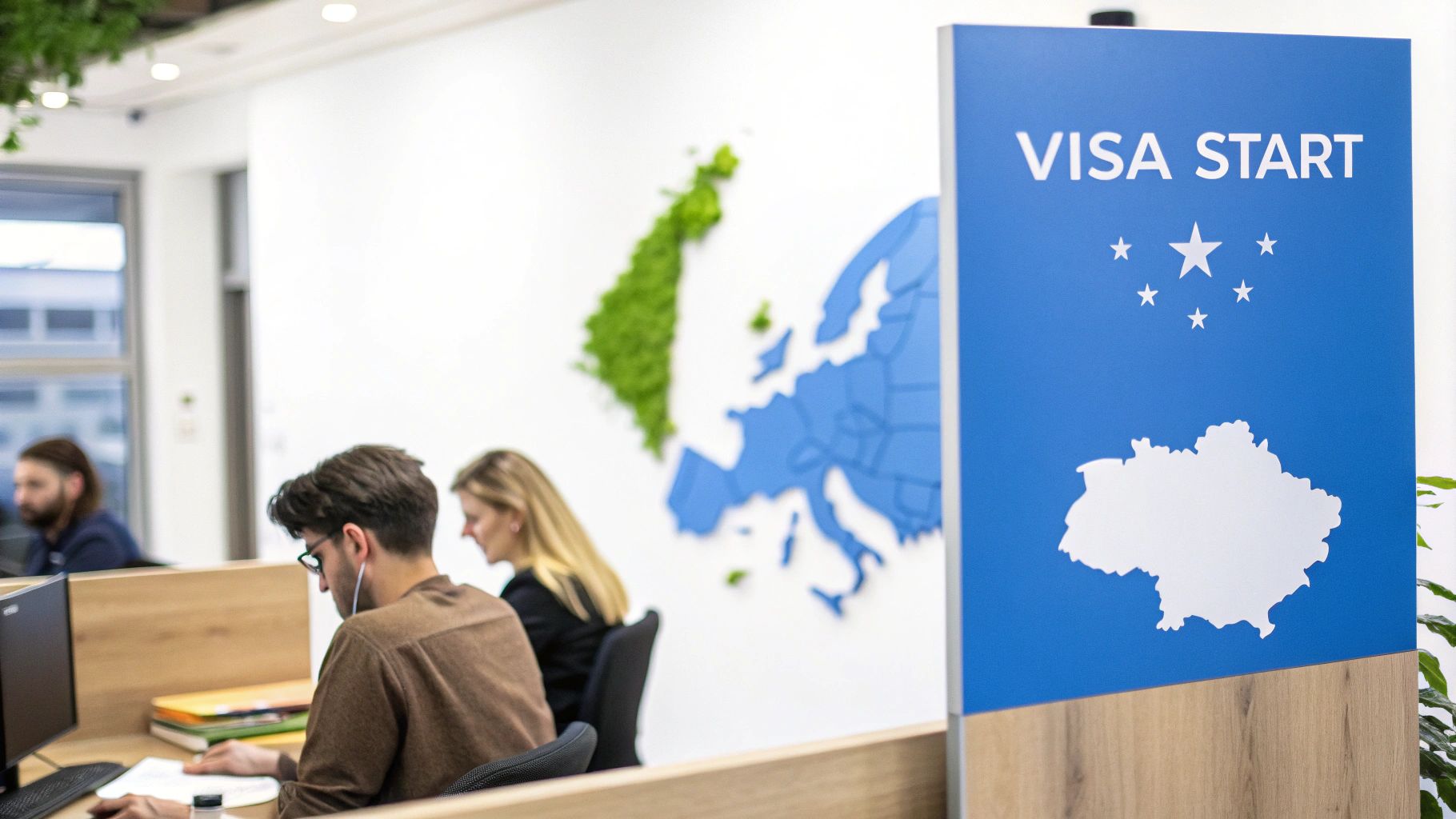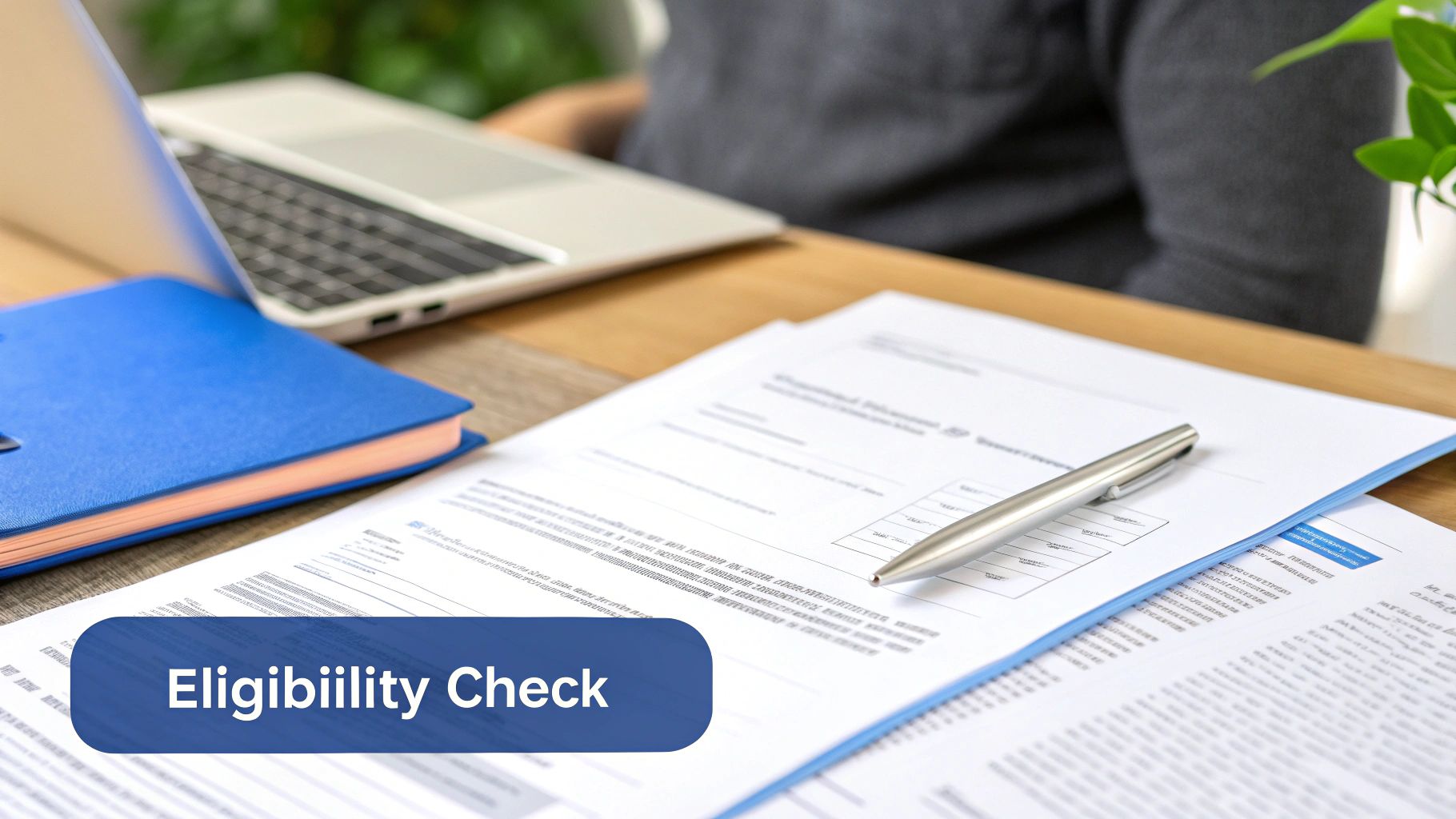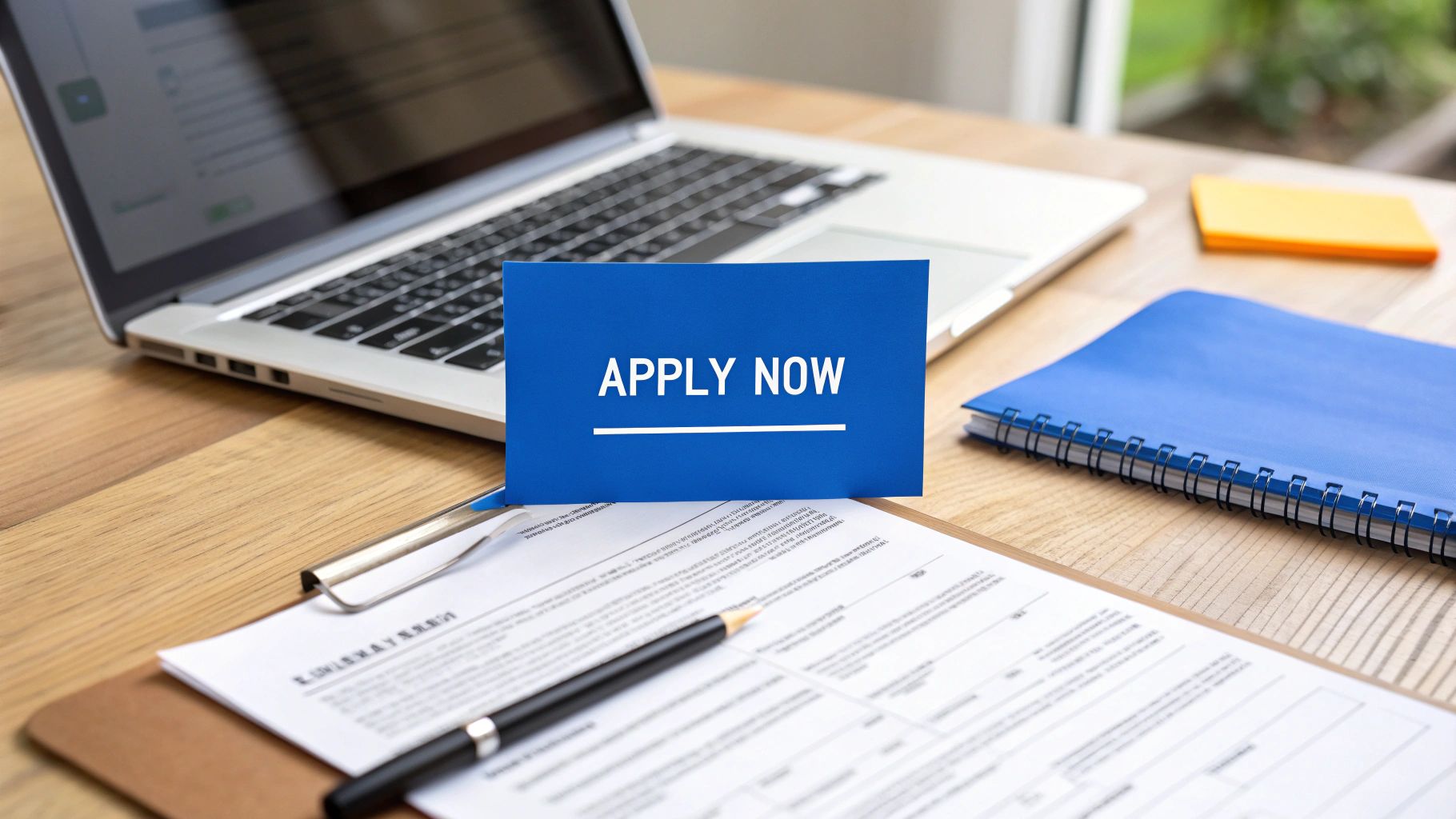German Job Seeker Visa: Expert Tips for Nigerians

The German Job Seeker Visa: Your Gateway to European Opportunity

For ambitious Nigerian professionals, the German Job Seeker Visa offers a unique path to a rewarding career in Europe. This visa isn’t just a permit; it’s a tool designed to connect skilled individuals with Germany’s thriving job market. It provides a dedicated period to explore opportunities and secure your future in a strong economy.
Why Germany? The Demand for Nigerian Talent
Germany recognizes the value of a diverse workforce and actively recruits skilled professionals worldwide, including from Nigeria. The country’s aging population and robust economy create consistent demand in various sectors. This presents a valuable opportunity for Nigerians with the right qualifications and experience to fill these roles and build successful careers. It’s not just about finding any job; it’s about finding the right job in a country that values your skills.
Understanding the Job Seeker Visa: A Stepping Stone to Success
The German Job Seeker Visa provides a six-month window to search for employment within Germany. This timeframe allows you to experience the German work culture, network with potential employers, and attend interviews. The visa acts as a bridge, giving you the time and legal standing needed to transition from job seeker to employed professional. It’s a significant asset in establishing a long-term career in Germany.
The Job Seeker Visa facilitates entry for non-EU nationals into the German job market. Applicants must meet specific criteria:
- A recognized degree
- At least five years of relevant work experience
- Sufficient financial resources
Learn more about the German Job Seeker Visa. The Federal Agency for Employment reports a roughly 70% success rate for finding a job within the six-month timeframe. This visa is the initial step, offering the potential to transition to a work visa upon securing employment.
Thinking Beyond the Application: Long-Term Prospects
The German Job Seeker Visa isn’t just about finding immediate employment; it’s about laying the foundation for a successful future in Germany. Securing a job allows you to transition to a longer-term work visa. This then opens doors to permanent residency and even citizenship. This means building a life, integrating into the community, and contributing to Germany’s ongoing growth and development. The visa is a gateway to a new chapter in your professional and personal life.
Meeting the Mark: Eligibility Requirements That Actually Matter

Securing a German Job Seeker Visa for Nigerian applicants involves understanding the specific qualifications that German employers and visa officers prioritize. This section outlines those key requirements, offering insights to ensure a successful application.
Recognizing Your Nigerian Qualifications
For Nigerian applicants, one of the initial steps is ensuring your educational credentials are recognized in Germany. The Anabin database is a crucial tool for this process. It lists foreign educational institutions and their German equivalencies. Checking your university and degree on the Anabin database is essential.
What if your institution isn’t listed or your credentials face challenges? You might need to provide supplementary documentation, such as course syllabi or transcripts, to demonstrate the equivalence of your qualifications. This process can be navigated successfully with the right preparation.
Showcasing Your Professional Prowess
Work experience is another vital component of your application. German employers highly value practical experience and seek clear evidence of your skills and accomplishments. Therefore, presenting your professional background in a manner aligned with German standards is essential.
Structuring your CV to highlight quantifiable achievements and tailoring it to the specific jobs you are targeting is crucial. Strong references can significantly bolster your application. Ensure your references are reputable individuals who can effectively showcase your professional abilities and work ethic.
Language Proficiency: A Critical Factor
German language proficiency is often a deciding factor in the German Job Seeker Visa application. While English proficiency can be beneficial, demonstrating German language skills provides a distinct advantage. Certain certificates, such as the Goethe-Zertifikat or TestDaF, carry considerable weight. The Goethe-Zertifikat and TestDaF exams are recognized internationally.
Even without these specific certificates, demonstrating language competence through other means is possible. This might include proof of German language courses, participation in language exchange programs, or highlighting any German language experience in your CV.
Financial Stability: Proving Your Resources
Proof of sufficient financial resources to cover living expenses during your job search is mandatory for the German Job Seeker Visa. This assures authorities that you can support yourself without relying on public funds. A blocked account is the most common way to fulfill this requirement.
A blocked account involves depositing a specific amount into a German bank account, accessible only after arriving in Germany. While a significant expense, alternative options exist. Some banks offer specialized blocked account products tailored for Job Seeker Visa applicants. Exploring these alternatives can ease the financial burden.
To help you prepare, we’ve compiled a checklist of the requirements:
German Job Seeker Visa Requirements Checklist: A comprehensive list of all documentation and qualifications required for Nigerian applicants
| Requirement | Details | Tips for Nigerian Applicants |
|---|---|---|
| Recognized Qualifications | Your Nigerian degree needs to be recognized in Germany. | Use the Anabin database to check the status of your institution and degree. Provide additional documentation (syllabi, transcripts) if required. |
| Professional Experience | Relevant work experience strengthens your application. | Tailor your CV to German standards, highlighting quantifiable achievements. Secure strong references from reputable sources. |
| Language Proficiency | German language skills are highly advantageous. | Aim for recognized certificates like Goethe-Zertifikat or TestDaF. Alternatively, provide proof of other German language experiences. |
| Financial Stability | Proof of funds to cover living expenses is mandatory. | A blocked account is the most common method. Explore alternative options like specialized blocked account products or sponsorship. |
This checklist provides a clear overview of the key elements for a successful German Job Seeker Visa application. Remember to thoroughly research each requirement and prepare your documentation accordingly.
Navigating the Application Process: A Nigerian Perspective

Preparing for a German Job Seeker Visa as a Nigerian professional requires careful planning and execution. This section offers practical guidance, addressing common challenges and providing insights gleaned from successful applicants.
Documentation Preparation: A Step-by-Step Approach
The initial step involves compiling the necessary documents. This not only means gathering the paperwork but also ensuring it conforms to German standards. Degree authentication, for instance, can present a unique challenge for Nigerian applicants.
Verify your qualifications are recognized in the Anabin database. Should you encounter discrepancies, be prepared to provide supplementary documentation such as detailed course descriptions.
Securing effective reference letters is also essential. These letters should clearly outline your skills and experience, emphasizing quantifiable achievements. This differs from the more general recommendations sometimes prevalent in Nigeria. This meticulous approach strengthens your application.
Booking Your Appointment: Abuja and Lagos
With your documents prepared, the next step is scheduling an appointment at the German Embassy in Abuja or the Consulate in Lagos. The appointment system is often competitive, so booking early is crucial.
Regularly monitoring the embassy website for newly available slots can significantly improve your chances of securing an earlier appointment. Be aware of potential delays and formulate a contingency plan.
This might entail arranging travel to either Abuja or Lagos, depending on appointment availability and your location within Nigeria. Flexibility is essential in this phase.
The Interview: Cultural Nuances and Common Mistakes
The interview is a pivotal stage in the application process. Understanding cultural nuances can impact how your application is perceived. German communication tends to be direct, potentially contrasting with Nigerian professional norms.
Directly and concisely answering questions, avoiding ambiguity, and maintaining eye contact are generally perceived favorably. Common pitfalls include inadequate preparation, inconsistencies between your documents and interview responses, and a lack of clear career goals for your time in Germany.
Thorough preparation and clear communication are vital. Germany has recently witnessed a surge in work visas granted. In 2022, Germany issued 152,336 national work visas, a considerable increase from the 97,000 issued in 2021. Detailed statistics are available for review. This demonstrates Germany’s active recruitment of skilled professionals.
Payment and Processing: A Nigerian Perspective
Understanding the payment methods accessible to Nigerians is critical. Ensure you are familiar with accepted payment methods and any associated fees. This might involve utilizing international money transfer services or bank drafts.
Processing times can fluctuate, so account for potential delays. Stay updated on current processing timelines by checking the embassy or consulate website. Anticipating potential delays prevents unexpected setbacks and streamlines the overall process.
Cracking the German Job Market as a Nigerian Professional
Securing a job in Germany requires a well-defined strategy. More than just a visa, success hinges on understanding the nuances of the German job market. This section offers practical advice tailored for Nigerian professionals, guiding you through the process of establishing a successful career in Germany.
Identifying Opportunities: Industries Valuing Nigerian Expertise
Germany’s dynamic economy offers a range of opportunities for skilled professionals from Nigeria. Certain sectors are particularly receptive to international talent.
The Information Technology sector, driven by Germany’s focus on digitalization, consistently seeks skilled IT specialists. Engineering remains a cornerstone of the German economy, offering diverse opportunities for qualified engineers. The Healthcare industry, facing the demands of an aging population, presents ongoing needs for medical professionals.
Researching these high-demand sectors and highlighting the relevant skills in your application can significantly improve your chances of securing a job.
Transforming Your CV: The German-Style Resume
Adapting your CV to German standards is crucial. A German resume typically differs from a Nigerian CV in several key aspects. Including a professional photo, a detailed personal profile, and a chronological work history emphasizing quantifiable achievements are standard practice.
- Focus on quantifiable achievements: Use metrics and data to demonstrate the impact of your work. Instead of listing responsibilities, showcase accomplishments.
- Include a personal profile: This concise summary of your skills and career goals allows employers to quickly assess your suitability for the role.
- Professional Photo: A professional headshot is generally expected on German resumes.
Networking for Success: Connecting From Nigeria
Building a professional network is essential, even before arriving in Germany. Online platforms like LinkedIn are valuable tools for connecting with professionals in your field. Engaging in online industry forums and participating in webinars can broaden your reach and offer insights into the German job market.
This proactive approach can help you establish valuable contacts and gain a deeper understanding of the German professional landscape.
Mastering the Interview: Cultural Nuances and Communication
German interview practices emphasize direct communication, focusing on technical expertise and proven experience. Be prepared to articulate your qualifications clearly, providing concrete examples of your accomplishments. Detailed discussions about your skills and expertise are common. Adapting your communication style to this direct approach is key.
Salary and Contracts: Understanding German Expectations
Researching industry-standard salaries for your profession is essential for effective negotiation. Websites like Glassdoor and Gehalt.de provide valuable salary data for various roles in Germany. Familiarizing yourself with standard contract terms, including probation periods and vacation entitlements, is crucial.
Germany’s commitment to attracting international talent is evident in programs like the “Opportunity Card”, which simplifies the process for those with vocational training in sectors like manufacturing and construction. The German job market, with approximately 770,301 job openings in 2023, offers significant potential. For further insights into visa success rates, visit terratern.com. The VisaMatchUK Blog provides additional information regarding visa processes.
To help you focus your job search, we’ve compiled a table highlighting key industries with strong demand for Nigerian professionals:
To assist you in your job search, here’s a table highlighting promising industries for Nigerian professionals:
Top German Industries for Nigerian Professionals
| Industry | Demand Level | Required Qualifications | Average Salary |
|---|---|---|---|
| Information Technology | High | Bachelor’s/Master’s degree in Computer Science, relevant certifications | €50,000 – €80,000 per year |
| Engineering | High | Bachelor’s/Master’s degree in Engineering (various specializations) | €45,000 – €75,000 per year |
| Healthcare | High | Medical degree, specialization, German language proficiency | €60,000 – €100,000+ per year |
This table offers a quick overview of potential career paths, expected qualifications, and general salary ranges. Remember that specific requirements and salaries can vary based on location, company, and experience level. Further research is always recommended.
Smart Money: Financial Planning for Your German Journey

Moving from Nigeria to Germany for work requires careful financial preparation. This section offers practical advice and insights to help you navigate the financial aspects of obtaining a German job seeker visa.
Understanding The Costs: A Realistic Breakdown
Relocating to a new country involves various expenses. For your move to Germany, these typically include visa application fees, travel costs from Nigeria, and initial setup costs once you arrive.
Beyond these initial outlays, you’ll also need to factor in daily living expenses. These include accommodation, food, transportation, and health insurance coverage during your job search. Thorough planning for these costs will ensure a smoother transition.
Proof of Funds: Meeting the Requirements
The German Job Seeker Visa requires applicants to demonstrate proof of sufficient funds for their stay. The most common way to do this is through a blocked account. This type of account holds a pre-determined amount of money, which you can access only after arriving in Germany.
Nigerian applicants sometimes find the blocked account process complex. However, various banks specialize in blocked account services designed for visa applicants. Researching these options will simplify the procedure.
Managing Your Finances: Naira to Euro
The exchange rate between the Nigerian Naira and the Euro is an important factor to consider. Staying up-to-date on current exchange rates and using reputable money transfer services can help minimize potential financial losses.
Opening a German bank account upon arrival is also recommended. This will simplify managing your finances and facilitate receiving salary payments once you find employment.
Affordable Housing: Navigating the German Market
Securing affordable accommodation in Germany, particularly in larger cities, can be a challenge. Researching various housing options is essential. Consider shared apartments (WGs) or exploring smaller cities with lower living costs to make the most of your budget.
Start your housing search early. Utilize online platforms and network with Nigerian communities in Germany for potential leads.
Budgeting For Your Job Search: Six Months and Beyond
The German Job Seeker Visa provides a six-month window for your job search. Creating a realistic budget that covers your essential living expenses for this period without employment income is crucial.
Contingency planning is equally vital. Consider what might happen if your job search extends beyond the initial six months. Having a backup plan can alleviate potential financial stress. This might involve exploring part-time work opportunities or adjusting your budget. If possible, bring more funds than the minimum required. This extra financial cushion will provide security if your job search takes longer than anticipated.
Beyond The Job Seeker Visa: Building Your German Future
Landing a job in Germany is a huge step, but it’s only the first part of your journey. This section helps Nigerian professionals navigate the next phases, from converting their Job Seeker Visa to establishing long-term residency.
From Job Seeker To Work Permit Holder
After securing a job offer, transitioning from the Job Seeker Visa to a German work permit is the next step. This process is usually straightforward, especially if you already fulfilled the Job Seeker Visa requirements. Your employer will typically assist with the necessary documentation and provide guidance.
Choosing The Right Permit: Options For Nigerian Professionals
Nigerian professionals in Germany have a few permit options. The most common are the EU Blue Card and the standard German Residence Permit. The EU Blue Card provides advantages for those in high-demand sectors like IT and engineering, with a higher salary requirement. It also offers a faster route to permanent residency. The standard German Residence Permit, while not as benefit-rich as the EU Blue Card, still enables long-term residency. Selecting the right permit for your career goals is essential for your future success.
Residence Permit Application: A Practical Guide
Applying for a residence permit usually involves submitting documents like your employment contract, proof of health insurance, and other necessary paperwork to the Foreigners’ Registration Office (Ausländerbehörde). Be aware of potential processing times and understand the specific requirements for your chosen permit. Staying organized and proactive will ensure a smooth transition.
Integrating Into German Society
Integrating into German society goes beyond your professional life. It involves understanding and respecting German customs, engaging with the local community, and potentially learning the language. While English is widely spoken, especially in professional environments, learning German significantly improves your integration and provides a deeper cultural understanding. This integration is a gradual process, crucial for a fulfilling life in Germany.
Professional Advancement In Germany
Germany’s focus on professional development offers numerous opportunities for Nigerian professionals to advance their careers. Explore continuing education, networking events, and industry-specific certifications to further your career goals. Actively participating in professional development demonstrates your commitment to growth and opens new doors.
Bringing Your Family: Reunification Process
Bringing family to Germany is a priority for many Nigerian professionals. The family reunification process allows you to sponsor your spouse and children. Understanding the documentation requirements, processing times, and potential challenges is essential. Being prepared and managing expectations will streamline the process.
Long-Term Goals: Permanent Residency And Citizenship
Germany offers paths to permanent residency and citizenship for those seeking long-term stability. The requirements typically include maintaining legal residency for a certain period, demonstrating financial stability, and meeting language proficiency standards. These pathways often represent the culmination of your integration and professional achievements in Germany. Understanding the requirements for each stage will help you plan for a secure future.
Planning your future in Germany involves careful consideration of these factors. Navigating these stages with awareness and preparation will help you build a successful life in your new home.
Ready for the next step in your German relocation? JapaChat, Nigeria’s AI-powered immigration platform, provides personalized guidance and support for Nigerians moving abroad. Visit JapaChat today to explore visa options, understand requirements, and connect with a community of Nigerians making similar moves.
Comments
One response to “German Job Seeker Visa: Expert Tips for Nigerians”
-
[…] a preliminary German language course (2-6 months), even if the program itself is taught in English. Learn more about DAAD (German Academic Exchange Service) Scholarships to get started on your application […]

Leave a Reply